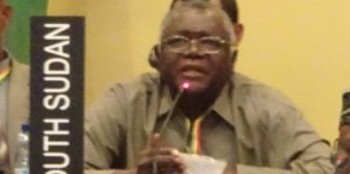UNESCO expresses condolences over Edward Jubara's death in Khartoum

UNESCO has expressed its condolences to the family, friends and colleagues of Edward Ernest Jubara Ali, Director General of Archives and Antiquities for the government of South Sudan, who passed away in Khartoum on 18 November.
Jubara, born on 1 January 1950 in Torit, worked with UNESCO since the country’s independence in 2011 to harness the potential of culture for peacebuilding and sustainable development in the world’s youngest nation.
“Edward Jubara was instrumental in liaising between UNESCO and the Government to promote South Sudan’s ratification of key UNESCO Conventions in the field of culture, namely the 1972 World Heritage Convention, the 2003 Intangible Cultural Heritage Convention, and the 2005 Convention for the Protection and Promotion of the Diversity of Cultural Expressions,” said Mr. Salah Khaled, former Head of the UNESCO Office in Juba. “His loss has shocked all of us, and my prayers go out to his family,” he added, “He will sincerely be missed”.
“Following South Sudan’s ratification of three UNESCO Conventions in the field of Culture in 2016, Edward Jubara worked indefatigably alongside the Minister of Culture, Youth, and Sports, to support their implementation on the ground,” said Mr. Umar Alam, Head of the UNESCO Office in Juba. “With his support and close collaboration with UNESCO, South Sudan has developed a Culture Policy, a tentative list of potential World Heritage sites, and trained a team of experts to inventory South Sudan’s rich intangible cultural heritage”, Mr. Alam added.
“I had the great honour to work hand-in-hand with Edward on the Culture programme in South Sudan,” said Ms. Karalyn Monteil, Regional Advisor for Culture at the UNESCO Regional Office for Eastern Africa, “Over the years, I witnessed how he put his heart and soul into developing the culture sector in South Sudan. He represented his country with dignity and optimism at World Heritage and Intangible Cultural Heritage Committee meetings. Through his interventions in these international arenas, he showed the world another side of South Sudan that is not covered on the daily news, and expressed his confidence that nurturing the culture sector would sow the seeds for long lasting peace and development,” she added.
“I am heartbroken by this news of Edward’s passing,” said Ms. Ellen Lekka, UNESCO Consultant responsible for the South Sudan National Archives project in Juba, “we formed a close working relationship since I joined the UNESCO Juba Office in 2013 and I could always count on him as a colleague and a friend. I will always remember him with his big smile and carrying that heavy briefcase, like a mobile office, determined and committed to his work. His presence in the lives of everyone he met is irreplaceable,” she added. “My heartfelt condolences go out to his family.”
“Mr. Jubara will be greatly missed by all of the colleagues who worked closely with him at UNESCO. His personal commitment and passion to creating a culture of peace for development in South Sudan will not be forgotten. His efforts have helped to lay a solid foundation for the future development of the country,” said Ms. Ann Therese Ndong-Jatta, Director of the UNESCO Regional Office for Eastern Africa.
Edward Jubara was married with five children. He graduated from Sudan University of Science and Technology with a Bachelor’s of Science in 1973. He went on to obtain a diploma in Integrated Approach to Rural Development in Cameroon in 1979. He worked as the Acting Director of Youth & Sports for the Regional Government of Southern Sudan from 1973 to 1985.
During the war, he resided in Khartoum, Sudan and worked for NGOs and the private sector. In 2008, he worked as the Director of Culture for the Ministry of Culture and Heritage of the Government of Southern Sudan in Juba. In 2015, he was named Director General of Archives and Antiquities for the Ministry of Culture, Youth and Sports.
He was also designated national focal point for the UNESCO 2003 Intangible Cultural Heritage Convention in 2017. In this latter position, he attended annual Intergovernmental Committee Meetings where he brought the needs and aspirations of South Sudan to the global agenda.